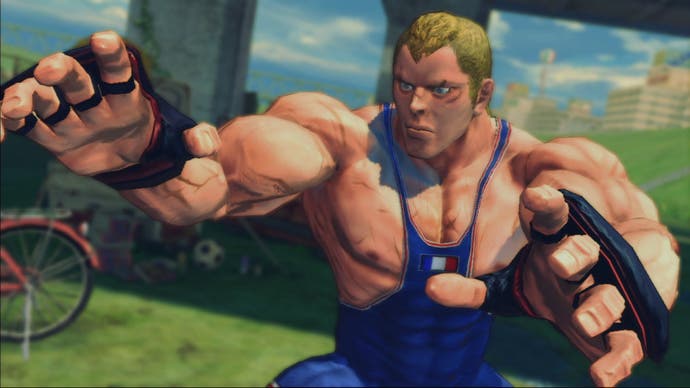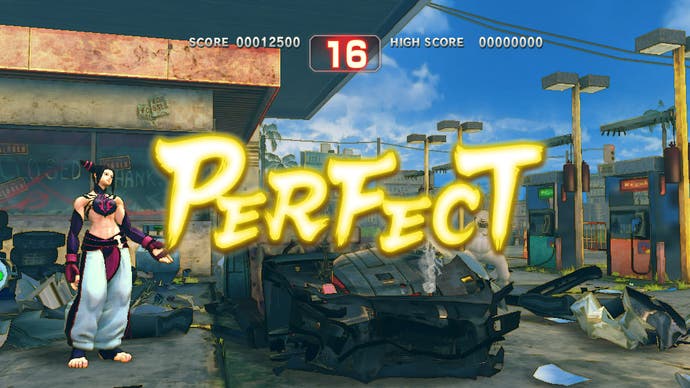Daigo Umehara: The King of Fighters
The Street Fighter world champion speaks.
And what about Street Fighter IV in particular? "To be honest, though it was visually great, I didn't get an impression that it was very different to what had gone before; I didn't get a sense that it was brand new. I had imagined that the game would be well done, but it wasn't sensational when I actually saw it. It didn't drive me wild with excitement. Rather I only picked it up because it was the latest Street Fighter, and that's what you do."
I ask Umehara if there's anything he'd want to change with the game. "I miss the Guard Clash system. I believe it should be revived. And the throw tech system I think adds to a slower defensive pace. And the new saving system, too, should be tweaked. The addition of the saving system is not harmful as such, but it needs an adjustment because the range of uses is narrow.
"Also, the back-dash is very strong in Street Fighter IV, and the saving, from which a character in defence position throws a move, allows the character to cancel into a back-dash. Too much back-dash slows down the speed of the game, and irritates players. I feel the game should be exciting, but there are too many defensive systems, preventing players from doing damage. The Guard Clash was there to solve that problem. It was such a good system, but for some reason, it got removed.

"I know it sounds harsh, but to be honest, if SFIV hadn't come out at this time when fighting games were booming, I don't know if it would have been as successful as it has been. Compared to other Capcom games, I find it a little unrefined. Still, gamers were dying for a new Street Fighter, and it fell on their laps at the right time. I think that the developers were too focused on making a bug-free and character-balanced game.
"Rather than thinking about where to improve, they focused on eliminating the problematic elements. Their intent was not to do something brand new but to avoid creating a bad game. I wanted to see a bit more; a little more of adventurous attitude towards development."
There is a sense in which a player of Umehara's calibre could not exist outside of the arcade scene. No matter how solid a developer's netcode, online competition can't compare with the thrill of sitting down opposite an opponent and fighting it out free of any threat of lag or latency.
Moreover, these pressure-cooker environments allow players to develop at a far quicker rate than over a net connection, where the stakes are necessarily lower by virtue of the detached, remote nature of fights. The news that the next iteration of Street Fighter IV may not be coming to arcades has caused uproar, not least amongst Japanese arcade players, who usually lead the field in exploring the limits of a game and uncovering techniques for the rest of the community to adopt. I ask Umehara for his take on Capcom's controversial decision.

"Of course, I am hugely disappointed by the decision," he says. "I wish that Super Street Fighter IV were coming to arcades. There's a chance that those in our community who don't play games at home never get to play the game. That said, I think the younger Street Fighter generation may survive. They don't really go to arcades but play at home. So there is a possibility that we can capture those young gamers and bring them into competitions."
Umehara's tone shifts, revealing sadness for a beloved culture that seems to be slipping away. For all Street Fighter IV's huge popularity in the West, it has done little to reinvigorate the arcade scene that birthed it. Without a healthy, vibrant arcade community nurturing tomorrow's star players, can the world in which Umehara excels sustain?
"SFIV has certainly breathed fresh air into the fighting game scene. It has helped to bring back people to the community. Overall, however, I don't think much has changed. What will happen to fighting games in the future will depend on whether they will shift towards home consoles or remain in the arcades.
"I personally think that whatever happens in Japan will not change the scene nearly so much as movements in the West. I go there to participate in the events, and I feel that first-hand. But if Western players continue to broaden their community and invite each other to tournaments, I feel that this culture that originally sprung up in Japan will somehow make its way back home."
Massive thanks to Capcom's Seth Killian, Shino Imao and Leo Tan from Capcom Europe for their assistance in helping Eurogamer make contact with Daigo Umehara. Special thanks to Shino Imao for her help in translation.
